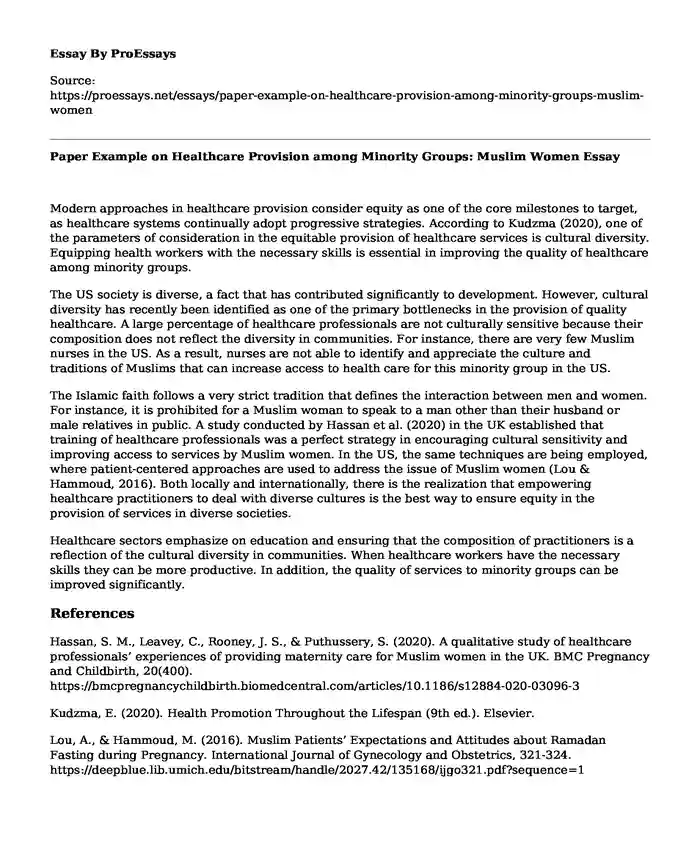Modern approaches in healthcare provision consider equity as one of the core milestones to target, as healthcare systems continually adopt progressive strategies. According to Kudzma (2020), one of the parameters of consideration in the equitable provision of healthcare services is cultural diversity. Equipping health workers with the necessary skills is essential in improving the quality of healthcare among minority groups.
The US society is diverse, a fact that has contributed significantly to development. However, cultural diversity has recently been identified as one of the primary bottlenecks in the provision of quality healthcare. A large percentage of healthcare professionals are not culturally sensitive because their composition does not reflect the diversity in communities. For instance, there are very few Muslim nurses in the US. As a result, nurses are not able to identify and appreciate the culture and traditions of Muslims that can increase access to health care for this minority group in the US.
The Islamic faith follows a very strict tradition that defines the interaction between men and women. For instance, it is prohibited for a Muslim woman to speak to a man other than their husband or male relatives in public. A study conducted by Hassan et al. (2020) in the UK established that training of healthcare professionals was a perfect strategy in encouraging cultural sensitivity and improving access to services by Muslim women. In the US, the same techniques are being employed, where patient-centered approaches are used to address the issue of Muslim women (Lou & Hammoud, 2016). Both locally and internationally, there is the realization that empowering healthcare practitioners to deal with diverse cultures is the best way to ensure equity in the provision of services in diverse societies.
Healthcare sectors emphasize on education and ensuring that the composition of practitioners is a reflection of the cultural diversity in communities. When healthcare workers have the necessary skills they can be more productive. In addition, the quality of services to minority groups can be improved significantly.
References
Hassan, S. M., Leavey, C., Rooney, J. S., & Puthussery, S. (2020). A qualitative study of healthcare professionals’ experiences of providing maternity care for Muslim women in the UK. BMC Pregnancy and Childbirth, 20(400). https://bmcpregnancychildbirth.biomedcentral.com/articles/10.1186/s12884-020-03096-3
Kudzma, E. (2020). Health Promotion Throughout the Lifespan (9th ed.). Elsevier.
Lou, A., & Hammoud, M. (2016). Muslim Patients’ Expectations and Attitudes about Ramadan Fasting during Pregnancy. International Journal of Gynecology and Obstetrics, 321-324. https://deepblue.lib.umich.edu/bitstream/handle/2027.42/135168/ijgo321.pdf?sequence=1
Cite this page
Paper Example on Healthcare Provision among Minority Groups: Muslim Women. (2023, Dec 13). Retrieved from https://proessays.net/essays/paper-example-on-healthcare-provision-among-minority-groups-muslim-women
If you are the original author of this essay and no longer wish to have it published on the ProEssays website, please click below to request its removal:
- Cultural Relevance of Mental Health Patient Navigators for Ethnic Minority Groups
- Essay on Confederate Statures and Historical Racism
- Essay Sample on Influence of Female Autonomy on the Indian Society
- Instances Proving That Women Are Treated Inferior to Men in Handmaid's Tale
- Annotated Bibliography on Bullying in Elementary School
- Essay Sample on Hand Hygiene
- Essay Example on 80-Year-Old's Struggle with Sepsis: Yoder Sherman's Story







